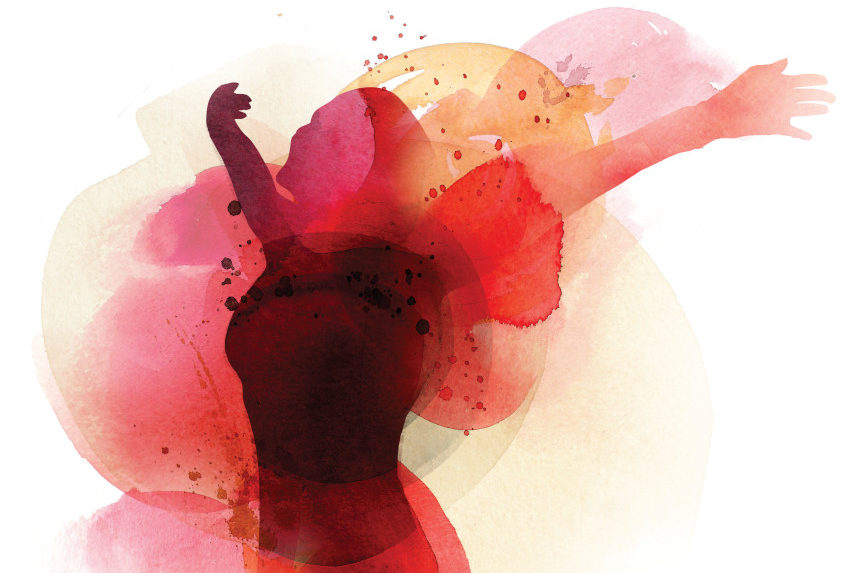My 99-year-old mother sits in her black leather recliner all day at an assisted living facility in South Jersey. Her aides, trying to keep her engaged in life, encourage her to attend armchair exercise sessions and other activities, but she steadfastly refuses. To partake in them, she would have to do something abhorrent: associate with the other residents.
“I don’t want anything to do with them,” she says. “They’re not my type. They’re a bunch of old hags. Not one of them has anything to say.”
“But you’ll get lonely if you stay in your room all day long,” the aide insists.
“Whenever I get lonely, I just look in the mirror and I have all the company I want,” Mom snaps.
Time is running out for my mother. I wish I could savor every remaining moment I spend with her, but it is comments like these that plague me with ambivalence. On the one hand, I admire her spunk and independence; on the other, I cringe at her disdain and narcissism, knowing all too well they are not the byproduct of old age. Sadly, they are an integral part of her personality, reminiscent of the difficult person she has always been.
I always wanted a normal mother, who liked people, had friends that she kept, and approved of her family — at least some of the time.
In my mother’s eyes, our flaws loomed larger than anything else about us, and defined who we were.
Decades before “assisted living” was even a concept, my mother made fault-finding an Olympic sport. With the ferocity of a champion, she identified the “defects” in each family member and made it her life’s work to defeat them. In my mother’s eyes, our flaws loomed larger than anything else about us, and defined who we were. Our personal assets were nullified by the enormity of our perceived failures.
My sister was “Little Miss Teardrop.” She had a warm and cheerful personality but was “delicate” and cried too much.
My brother, “maladjusted.” He was a “genius” all right, but had trouble making friends.
My father, an “ostrich.” Although a beloved family doctor, he “buried his head in the sand, and refused to face reality.”
I, the youngest, was “empty-headed.” Although “pretty,” I had “nothing to say” — just like her fellow residents today.
“Be like that girl Elaine,” my mother urged me. Elaine was one of my classmates who my mother frequently spoke to me about. “She has a crooked nose and buck teeth,” Mom said, “but she’s got plenty of spunk and confidence. And just look at her sparkling eyes.”
More than anything else in life, it seemed, my mother wanted mine to sparkle just like Elaine’s. I sometimes stood in front of the mirror, searching my eyes for any hint of a sparkle, not quite sure what that meant. Was it anything like the blue and gold glitter in my new painting kit? I wondered.
When Mom wasn’t harping on our flaws and comparing us to others, she was devising ways to improve us. On the bright yellow tiles that lined the kitchen walls, she once bought a black magic marker and, with its indelible ink, wrote in giant letters, one per tile: K-E-E-P
B-U-S-Y and S-P-E-A-K S-L-O-W-L‑Y. The former admonishment was aimed at me, as though idleness was the cause of my “emptiness.” The second, at my sister, whose innate enthusiasm resulted in a rapid-fire outpouring of thoughts and feelings. “Enunciate. Articulate. Speak distinctly,” Mom ordered.
In addition to speaking clearly, nothing in life was as important as reading, and at least several times a week, Mom would remind me — no, command me — to “stretch your mind.” One summer, when I was in junior high, she insisted I read Pearl Buck’s The Good Earth. “Strive for 60 pages an hour,” she ordered. I placed a small white clock on the coffee table, next to my chilled glass of Hawaiian Punch, and struggled to maintain the pace. I skipped paragraphs, missed key points, glossed over language that I should have savored, but at least I followed my mother’s orders.
Another time, while lying on the beach outside our summer home in Margate, New Jersey, immersed in Lauren Bacall’s memoir, By Myself and Then Some, I was jolted out of my reverie by Mom. “Why do you waste your time reading that junk?” she asked contemptuously. “Life is short. Fill your head with only great ideas.
“Have you read The Deptford Trilogy yet, as I’ve been telling you to?” she asked for the umpteenth time.
I hadn’t.
“Well, what are you waiting for,” she continued. “Get off the beach, walk to the library, and check out that book. Now!”
I obeyed.
For several years, my mother worshipped Robertson Davies — the book’s acclaimed Canadian author — like a deity, determined to pass on his glory to everyone she knew. Davies, who wrote the trilogy in the 1970s, was the recipient of numerous literary awards.
First, my mother gave a copy of the book as a birthday present to her best friend. Next, one went to my niece when she graduated from high school. And when my cousin’s son had his bar mitzvah, he, too, got the special gift. Whether through a present, a comment, a personal attack, or a gesture, my mother never missed an opportunity to broadcast who she was or what her values were.
My mother committed herself to becoming a teacher, a profession she loved, but after a few years, she bowed to the social pressure of the day and gave it up to start a family. She met my father when they were both waiting tables at Breakers Hotel, in Atlantic City in 1938, just before her 20th birthday.
“You’re the nicest girl I ever met,” Dad said.
“I bet you say that to all the girls,” Mom replied.
“Do you doubt the veracity of my verbosity?” Dad responded. Mom fell instantly in love.
“I’m going to marry Sidney Kochman,” she announced to her mother when she returned home to Baltimore at summer’s end.
“When?” her mother asked.
“As soon as I ask him,” she said.
Mom’s exuberance for everything — marrying the man of her dreams, becoming a teacher, pontificating, having children (and despite her constant castigating, she did love us passionately) — was matched by her love of the natural world.
“Wake up,” she shouted on weekend mornings, barging into my bedroom and yanking up the Venetian blinds with such gusto I was sure they’d be pulled out of their brackets and fall smack onto the floor. A burst of sunlight would then flood the room, nearly blinding my half-open eyes.
“Go outdoors,” she’d shout. “It’s a beautiful day. It’s a sin to be inside.”
I’ll never forget the time I was about to step into the shower. “Marilyn, come here quick,” my mother shouted.
Please God, don’t let Mom be having a heart attack, I prayed, grabbing a towel and running into the kitchen, fearing the worst. But no, there was no cardiac crisis at all. My mother, in fact, was sitting at the table with a wondrous smile on her face. “Look!” she enthused, pointing to the deep orange cantaloupe she had just cut in half. “Look how these tiny, delicate seeds are nestled together! Each one has its own place — there’s not one wasted space. How can anyone doubt the existence of God when they cut open a cantaloupe?”
“You should see my new neighbor,” she says. “She’s all stooped over when she walks, and moves so slowly, you’d think she was dead. She’s ugly, too.”
And how can I help but harbor a secret admiration for my mother? Despite her constant rebukes and her disapproval of me, I still marvel at her longevity and vitality, and it is to her that I owe my fierce love of nature and reading.
My siblings and I visit Mom frequently at her assisted living facility. Afterward, we have endless discussions. “How was Mom when you visited last Sunday?” I ask. “Is her mood okay? Is she eating? Are people talking to her?” I grow sad, wishing she had been as much of a mother to me as I am now to her.
Last Sunday was my turn to visit. As usual, she was sitting on her black recliner, looking as frail as ever. On the floor surrounding her chair, in a jumbled heap, were the staples of her life: Werther’s butterscotch candies and empty candy wrappers; ripped-out pages of articles she found interesting in the Philadelphia Inquirer; the book Team of Rivals, which, with 500 pages yet to go, she has finally given up on; a small afghan I once crocheted for her; and dozens of photo albums capturing family life over the past seven-and-a-half decades. Nothing had changed since the last visit.
“You should see my new neighbor,” she says. “She’s all stooped over when she walks, and moves so slowly, you’d think she was dead. She’s ugly, too.”
I ignore the comments and try to make small talk. “So, how was your week, Mom? What’ve you been doing?”
She tells me about going through her treasures. She chuckles when she recalls the Polaroid snapshot of me as a 2-year-old licking an ice cream cone, chokes up when she describes finding a letter from my father. “I will love you forever,” he wrote. She tells me how grateful she is to have three wonderful children, and what a good life she’s had. She says she hopes she hasn’t been a burden.
And then: “Have I been a good mother?” I am taken aback.
She looks up at me. She is almost toothless; she’s hard of hearing; her cheeks are sunken in; for the past decade she has subsisted only on Boost; her frail frame practically melts into the seat. Her eyes are weary, pleading. For the first time in my life, it seems, she’s the one asking me for approval.
I pause. My chest tightens. My mind goes blank, then flashes back to me as a young girl, wondering if I would ever be smart enough to please her, likable enough to have friends.
Yet, I am moved by my mother’s words and hope she makes it to 100 in August. I open my mouth, not quite knowing how to respond. But finally, I do.
“The very best,” I say, leaning down to kiss her cheek.
Eleanor Hollander Kochman passed away in the early morning of March 21, 2018. It was five months before her 100th birthday.
This article is featured in the May/June 2021 issue of The Saturday Evening Post. Subscribe to the magazine for more art, inspiring stories, fiction, humor, and features from our archives.
Featured image: Shutterstock
Become a Saturday Evening Post member and enjoy unlimited access. Subscribe now




Comments
I loved reading Marilyn Kochman’s essay about her mother, whom I knew quite well. I have known Marilyn and her sister since nursery school days and was a frequent guest in their home over the years. I found her essay not only insightful but also loving and truthful. Marilyn has a great heart. It was so king of her to respond to her mother’s question about her mothering that she was the very best.
Thanks for this personal essay, Ms. Kochman. It’s not easy visiting a parent in an assisted living facility when they’re on the way down, especially when some of her worst aspects of the distant past are still there. You realized in that instant she was trying to be a good mother, despite everything; and you said and did the right thing. You did.